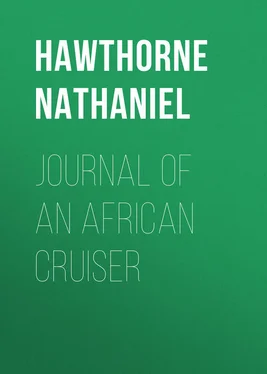Nathaniel Hawthorne - Journal of an African Cruiser
Здесь есть возможность читать онлайн «Nathaniel Hawthorne - Journal of an African Cruiser» — ознакомительный отрывок электронной книги совершенно бесплатно, а после прочтения отрывка купить полную версию. В некоторых случаях можно слушать аудио, скачать через торрент в формате fb2 и присутствует краткое содержание. Жанр: literature_19, foreign_antique, foreign_prose, на английском языке. Описание произведения, (предисловие) а так же отзывы посетителей доступны на портале библиотеки ЛибКат.
- Название:Journal of an African Cruiser
- Автор:
- Жанр:
- Год:неизвестен
- ISBN:нет данных
- Рейтинг книги:5 / 5. Голосов: 1
-
Избранное:Добавить в избранное
- Отзывы:
-
Ваша оценка:
- 100
- 1
- 2
- 3
- 4
- 5
Journal of an African Cruiser: краткое содержание, описание и аннотация
Предлагаем к чтению аннотацию, описание, краткое содержание или предисловие (зависит от того, что написал сам автор книги «Journal of an African Cruiser»). Если вы не нашли необходимую информацию о книге — напишите в комментариях, мы постараемся отыскать её.
Journal of an African Cruiser — читать онлайн ознакомительный отрывок
Ниже представлен текст книги, разбитый по страницам. Система сохранения места последней прочитанной страницы, позволяет с удобством читать онлайн бесплатно книгу «Journal of an African Cruiser», без необходимости каждый раз заново искать на чём Вы остановились. Поставьте закладку, и сможете в любой момент перейти на страницу, на которой закончили чтение.
Интервал:
Закладка:
22. – We have spent some days at Porto Praya, the capital of St. Jago, the largest of the Cape de Verd islands; whence we sail to-day. A large part of the population is composed of negroes and mulattoes, whose appearance indicates that they are intemperate, dissolute, and vile. The Portuguese residing here are generally but little better; as may be supposed from the fact, that most of those who were not banished from Portugal, for political or other offences, came originally to engage in the slave-trade.
Going ashore to-day, we beached the boat, and a large negro, with a ragged red shirt, waded out and took me on his shoulders. There is no position so absurd, nor in which a man feels himself so utterly helpless, as when thus dependant on the strength and sure-footedness of a fellow-biped. As we left the boat, a heavy "roller" came in. The negro lost his footing, and I my balance, and down we plunged into the surf. My sable friend seemed to consider it a point of duty to hold stoutly by my legs, the inevitable tendency of which manoeuvre was to keep my head under water. Having no taste for a watery death, under these peculiar circumstances, I freed myself by a vigorous kick, sprang to my feet, and seizing the negro by the "ambrosial curls," pushed his head in turn under the surf. But seeing the midshipmen and boat's crew laughing, noiselessly but heartily, at my expense, the ludicrousness of the whole affair struck me so forcibly that I joined in their mirth, and waded ashore as fast as possible. An abolitionist, perhaps, might draw a moral from the story, and say that all, who ride on the shoulders of the African race, deserve nothing better than a similar overthrow. Sailed from Porto Praya. The bay of this port is a good one, except in south-east gales, when the anchorage is dangerous. The town, called Villa de Praya, contains about two thousand inhabitants of every shade, the dark greatly predominating. Many vessels from Europe and the United States, bound to India, Brazil, or Africa, find this a convenient place to procure water and fresh provisions, and bring, in return, much money into the city. There are three hundred troops here, nearly all black, and commanded by forty Portuguese officers. The men are under severe discipline, are tolerably well dressed, and make a soldierly appearance. It is said that a St. Jago soldier formerly wore only a cocked hat, being otherwise in a state of nature; but I cannot pretend to have seen any instance of this extreme scantiness of equipment.
23. – Saw a large green turtle asleep on the surface of the water. One of our boats went alongside of him, and two men attempted to turn him over with boat-hooks. He struggled successfully, however, to keep himself "right side up," and, in a few moments, plunged beneath the surface. Once upon his back, he would have been powerless and a prisoner, and we might have hoped for the advantage of his presence at our mess-table.
24. – At noon, the first rain came. It continued heavy and unremitting, for twenty-four hours, after which there was a glimpse of the blue sky. Two startling thunder-claps burst over the ship, at about 9 o'clock, A.M. Last night, at 10, a heavy plunge carried away both our chain bobstays at once, and all hands were turned up in the rain, to secure the bowsprit.
The sanitary regulations of the squadron, induced by the commencement of the rainy season, cause considerable mirth and some growling. One rule is, that every man shall protect himself with flannel next his person, and at night shall also wear a cloth-jacket and trowsers. Stoves are placed on the berth-deck, to dry the atmosphere below. It is a curious fact, that, in March last, at Portsmouth, N. H., with the thermometer at zero, we were deprived of stoves the moment the powder came on board; while now in the month of July, on the coast of Africa, sweltering at eighty degrees of Fahrenheit, the fires are lighted throughout the ship.
27. – Continual rain for the last three days. All miserable, but getting used to it.
29. – A clear day, and comfortably cool. Wind fair.
30. – Made land, and saw an English brig of war. Commander Oakes, of the Ferret, came on board.
31. – Made Cape Mount.
August 1. – At 12, meridian, anchored at Cape Mesurado, off the town of Monrovia. We find at anchor here the U. S. brig Porpoise, and a French barque, as well as a small schooner, bearing the Liberian flag. This consists of stripes and a cross, and may be regarded as emblematical of the American origin of the colony, and of the Christian philanthropy to which it owes its existence. Thirty or forty Kroomen came alongside. Three officers of the Porpoise visited us. All are anxious to get back to the United States. They coincide, however, in saying that, with simple precautions, the health of this station is as good as that of any other. They have had only a single case of fever on board; and, in that instance, the patient was a man who ran away, and spent a night ashore.
My old acquaintance, Captain Cooper, came on board, and is to be employed as pilot.
CHAPTER III
Visit of Governor Roberts, &c. – Arrival at Cape Palmas – American Missionaries – Prosperity of the Catholic Mission – King Freeman, and his royal robe – Customs of the Kroo-people – Condition of native women.
August 2. – We were visited by Governor Roberts, Doctor Day, and General Lewis, the latter being colonial secretary, and military chief of the settlement. They looked well, and welcomed me back to Liberia with the cordiality of old friendship. The Governor was received by the commodore, captain, and officers, and saluted with eleven guns. He and his suite dined in the cabin, and some of the officers of the Porpoise in the ward-room. In the evening, we brought out all our forces for the amusement of our distinguished guests. First, the negro band sang "Old Dan Tucker," "Jim along Josey," and other ditties of the same class, accompanied by violin and tambourine. Then Othello played monkey, and gave a series of recitations. The French cook sang with great spirit and skill. The entertainments of the evening, as the theatrical bills expressed it, concluded with Ma Normandie and other beautiful songs and airs well executed by the French cook, accompanied by Symmes on the violin, and a landsman on the flute.
5. – Sailed for Cape Palmas, in company with the Porpoise.
9. – Anchored at Cape Palmas. We were boarded by Kroo-men, in eight or ten canoes. While the thermometer stood at 75 or 80 degrees, these naked boatmen were shivering, and seemed absolutely to suffer with cold; and such is the effect of the climate upon our own physical systems, that we find woollen garments comfortable at the same temperature.
Visited and lunched with Governor Rasswurm. Called on Mr. James, a colored missionary, now occupying the house of Mr. Wilson, who has lately removed to Gaboon river. Mr. James presented us with some ebony, and a few Grebo books. He informed us that the fever had visited him more or less severely, as often as once in four weeks during seven years. This may truly be called a feverish life! He is about to remove to Gaboon.
The Catholic Mission seems to have driven the Presbyterian from the ground. We called on Mr. Kelly, a Catholic priest from Baltimore, and the only white man of the Mission at present in Africa. Preparations, however, have already been made for twenty more, principally French, whose arrival is expected within a year, and who will establish themselves at different points along the coast. Mr. Kelly is now finishing a very commodious house, on a scale of some magnitude, with piazzas around the whole. There is evidently no lack of money. The funds for the support of the Catholic mission are derived principally through Lyons, in France; and the enterprise is said to be under the patronage of the king. The abundant pecuniary means which the priests have at command, and the imposing and attractive ceremonies of their mode of worship – so well fitted to produce an effect on uncultivated natures, where appeals either to the intellect or the heart would be thrown away – are among the chief causes of their success. It is said, too, and perhaps with truth, that as many converts are made, among the natives, by presents, as by persuasion. But no small degree of the prosperity of the mission must be attributed to the superior shrewdness and ability of the persons engaged in it – to their skilful adaptation of their precepts and modes of instruction to the people with whom they have to deal, and to their employment of the maxims of worldly policy in aid of their religious views. These qualities and rules of conduct have characterized the Catholic missionaries in all ages, in all parts of the world, and in their dealings with every variety of the human race; and their success has everywhere been commensurate with the superiority, in a merely temporal point of view, of the system on which they acted.
Читать дальшеИнтервал:
Закладка:
Похожие книги на «Journal of an African Cruiser»
Представляем Вашему вниманию похожие книги на «Journal of an African Cruiser» списком для выбора. Мы отобрали схожую по названию и смыслу литературу в надежде предоставить читателям больше вариантов отыскать новые, интересные, ещё непрочитанные произведения.
Обсуждение, отзывы о книге «Journal of an African Cruiser» и просто собственные мнения читателей. Оставьте ваши комментарии, напишите, что Вы думаете о произведении, его смысле или главных героях. Укажите что конкретно понравилось, а что нет, и почему Вы так считаете.












